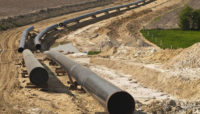$1B Gas Pipeline State Land Seizure Battle Gets High Court Review

A decision before the U.S. Supreme Court could have wide implications for construction of U.S. pipelines and other projects involving federal eminent domain power vs. state authority—even though the issue is an arcane legal one that does not specifically involve the natural gas project being decided.
In a case involving objections by New Jersey to state land seized by developers of the $1-billion PennEast pipeline, the U.S. Justice Dept.'s acting Solicitor General advocated for for broad federal powers and narrowed states rights,
“It’s an issue of where a delegation of federal eminent domain power to a private party runs head on into a state’s sovereign immunity,” Jennifer Danis, senior fellow at Columbia University Law School’s Sabin Center for Climate Change Law, told ENR. "That position reflects neither the Biden administration's climate policy nor environmental priorities, but rather the solicitor general’s unique role as part of an office that varies little with each new administration.”
The Federal Energy Regulatory Commission in 2017 authorized PennEast Pipeline Co. to build a 120-mile pipeline from Pennsylvania to New Jersey with granted use of eminent domain to obtain state land needed to build it. The pipeline would transport natural gas from the Marcellus Shale fields to New Jersey and New York markets.
At issue is a 2019 ruling by the federal appeals court in Philadelphia that said the U.S. Natural Gas Act, which governs natural gas pipelines, did not authorize a private line owner with FERC approval to condemn state land.
The ultimate question before the high court, which agreed to hear the case last month and is set to hear arguments April 28, is whether the U.S. government has broad eminent domain powers and whether states lack any right to object.
But the law is vague, says Tom Gilbert, director of energy, climate and natural resources for the New Jersey Conservation Foundation.
While Danis says this case is not focused on natural gas, advocates see it squarely as being about that. "The appellate court ruling, which the pipeline company is challenging, would not just undercut statutory framework, but also development and operation of critical natural gas infrastructure nationwide,” the American Gas Association and the Interstate Natural Gas Association of America said in a supporting legal brief filed March 8 with the court.
The groups claim the appeals court decision would give states the power to “veto” a federally approved interstate natural gas pipeline.
The International Union of Operating Engineers and the plumbers and pipefitters' union also said the ruling would result in loss of jobs caused by the abrupt halt of PennEast construction. The decision "will have serious and long-lasting negative consequences on the entire natural gas industry, including the many thousands of union workers who have trained extensively to build and maintain the natural gas pipeline infrastructure,” they said.
The U.S. Chamber of Commerce said the ruling would impact other natural gas pipelines, also due to state objections, in its March 8 brief.
PennEast argued that the appeals court ruling upends nearly 70 years of law that says states have no sovereign immunity from federal eminent domain power. “It provides a road map for converting state lands—including the beds of rivers forming state boundaries—into barriers to pipeline development, said PennEast. “That prospect well illustrates why the framers [of the Constitution] granted the new federal government the power to regulate interstate commerce."
Opponents of the PennEast pipeline and others have until the end of March to file their arguments.
In a statement, Maya van Rossum, who leads the Delaware Riverkeeper Network, said the Justice argument is "an abuse of power and trust and a failure of the current administration ... to protect people and our environment."
One opponent who did not speak for attribution said the best way for a state to halt a pipeline is to deny it a federal Clean Water Act water quality permit/
.



